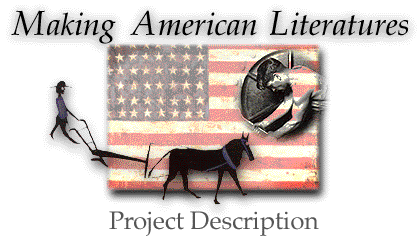
This project unites secondary-school and university teacher-scholars in sustained collaborative inquiry into the dynamic history of the making of American literature -- as a cultural practice of reading and writing, as a school/university subject, and as an academic discipline with changing canons, pedagogies, and theories of interpretation. Through extensive and focused reading, writing, and conversation, this project engages secondary-school and university teacher-scholars with literary texts as well as a variety of approaches for interpreting them; it explores issues bearing on the current state of the debate regarding the literary canon; it provides long-term support for the curricular enhancements that result from integrating traditional and non-traditional texts into daily classroom life; and it develops more practiced understandings of its three terms, "making," "American," and "literatures." Building upon models developed by the NEH-funded National Writing Project and two successful NEH summer institutes, this project will develop and demonstrate enriched reformulations of the humanities curriculum in three areas of the United States.
To historicize the place of literature in our national culture, this project will explore when, where, how, and why changing national and regional needs, shifting market economies, and varying standards of taste have produced multiple versions of American literature. Our conversations will include consideration of the role of American writing in the early Republic as well as its place in today's popular culture; review of nineteenth-century debates about the profession of authorship and the need for a distinct national literature; and critique of the ongoing formations of American literature as a school subject and an academic discipline. Accordingly, the humanistic content of this project will include both familiar and new texts. We will examine, for example, how studying the writing -- and the "classic" themes embedded in it --- of such frequently taught figures as Nathaniel Hawthorne, Mark Twain, and F. Scott Fitzgerald has been reshaped by recent scholarship. We will also consider how literary texts by these authors take on different meanings when paired with more contemporary or recently recovered texts by such authors as Sandra Cisneros, Nella Larsen, N.Scott Momaday, and Anzia Yezierska. In addition, we will explore the economic, aesthetic, and political forces that have shaped literary anthologies from the Colonial period to the present. We will study these texts and anthologies in light of scholarly developments that illuminate and complicate the category of the "literary" and in view of the multiple strategies of interpretation, ranging from "new criticism" to "new historicism." This, in turn, will lead to discussions of how such varying interpretations can shape classroom practice and inform current debates about the literary canon.
As we consider together what we study as "American literature," we will also explore questions about how we engage in -- and sustain -- scholarly work. We will consider the history of influential scholarly developments and widely debated theoretical strategies of interpretation. We will examine, for example, the social and economic processes that have defined and delivered "American literature" as a subject, and we will study such processes of discipline formation as the writing, editing, and publishing of scholarly articles as well as the economics of anthology making. We will explore the geographical, linguistic, and chronological boundaries that have been used to establish and/or challenge borders for the field, and we will also reflect on how to define and to teach more effectively an appreciation of the "literature" of "American literature." Some of these boundaries will be transcended by our participation in and analysis of conversations supported by new technology. Here we will pay particular attention to questions about how the "making" of literatures with new technologies will influence our conceptions of "the literary" in the twenty-first century, when "American literature" will be represented and discussed in forms far different from the traditional printed page.
Building upon the NEH-funded National Writing Project model and two successful NEH summer institutes, the structure of our project will echo one of its central themes; the relationship between local/regional and national cultures in the making of American literatures. The start-up of our project -- a one-day workshop held in late May simultaneously at the University of California, Berkeley, the University of Michigan, and Kennesaw State University -- will be followed by a national teacher-leader seminar in 1997 for 18 scholar-teachers from 3 regional sites. Through academic-year follow-up activities, participants will use inquiry projects in diverse settings to reevaluate their learning at the institute. They will draw on this classroom research as they prepare to collaborate in teaching 3 regionally-based 2-week institutes at the University of California, Berkeley; the University of Michigan; and Kennesaw State University in the summer of 1998. These regional institutes will expand the teacher leadership base for our project to include 45 more participants, selected from an open pool of applicants. By working through these regional centers, we will begin national dissemination of our work, a process which will be further enhanced by support from the National Writing Project's 160+ network of local sites.




